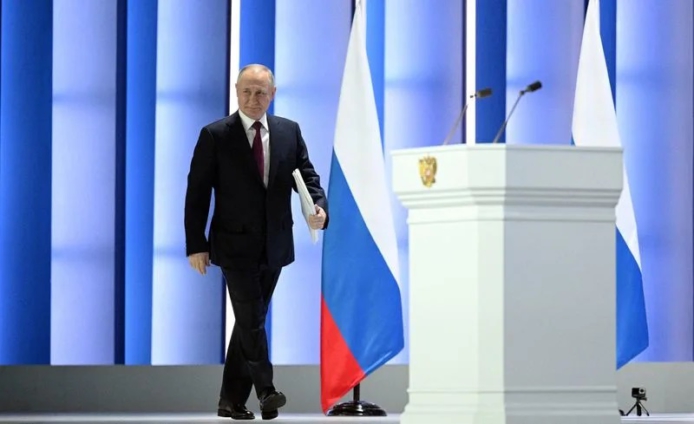President Vladimir Putin revoked on Tuesday a 2012 decree that in part underpinned Moldova's sovereignty in resolving the future of the Transdniestria region - a Moscow-backed separatist region which borders Ukraine and where Russia keeps troops.
The decree, which included a Moldova component, outlined Russia's foreign policy 11 years ago which assumed Moscow's closer relations with the European Union and the United States.
The order revoking the 2012 document was published on the Kremlin's website and states that the decision was taken to "ensure the national interests of Russia in connection with the profound changes taking place in international relations".
It is part of a series of anti-Western moves announced by Putin on Tuesday.
Alexandru Flenchea, Moldovan chairman of the joint control commission in the security zone around Transdniestria, said the cancellation did not mean that Putin was abandoning the notion of Moldovan sovereignty.
"The decree is a policy document that implements the concept of Russia's foreign policy," Flenchea told Publika-TV. "Moldova and Russia have a basic political agreement that provides for mutual respect for the territorial integrity of our countries."
The Kremlin has said that Russia's relations with Moldova, which last week approved a new pro-Western prime minister that vowed to pursue a drive to join the EU, were very tense. It accused Moldova of pursuing an anti-Russian agenda.
Wedged between Romania and Ukraine, Moldova, one of Europe's poorest nations, has been led since 2020 by President Maia Sandu with strong U.S. and European Union backing. U.S. President Joe Biden met her in Poland on Tuesday affirming his support.
The 2012 decree committed Russia to seeking ways to resolve the separatist issue "based on respect for the sovereignty, territorial integrity and neutral status of the Republic of Moldova in determining the special status of Transdniestria".
The Russian-speakers of Transdniestria seceded from Moldova in 1990, one year before the dissolution of the Soviet Union, amid fears that Moldova would merge with Romania, whose language and culture it broadly shares.
A brief war pitted newly independent Moldova against the separatists in 1992. But there has been virtually no violence in the past 30 years, with Russian "peacekeepers" still posted in the tiny sliver of land, which has no international recognition.
Moldova's foreign ministry said it would "carefully study" the document.
Latest Stories
-
‘It is false’- PMMC refutes claims of politicians smuggling gold from Ghana
2 minutes -
2 million NPP supporters did not turn up to vote – Kabiru Mahama
4 minutes -
IPR Ghana congratulates citizens for peaceful election, calls for unity
42 minutes -
Bawumia’s 8 minutes elite ball that zapped the energy of trigger happy politicians
2 hours -
It will be a betrayal if National Cathedral saga does not feature in ORAL’s work – Ablakwa
2 hours -
‘It’s unfortunate we had to protect the public purse from Akufo-Addo’ – Ablakwa on ORAL Team’s mission
2 hours -
Congo lawyers say Apple’s supply chain statement must be verified
3 hours -
Stampede in southwestern Nigerian city causes multiple deaths
3 hours -
Tens of thousands without water in Mayotte as curfew brought in
3 hours -
ORAL: We won’t witch-hunt, we’ll focus on transparency, not revenge – Ablakwa
4 hours -
Attempted robbery: Accused claims he carried cutlass for protection
4 hours -
Excavator operator jailed for stealing
4 hours -
African fans age-shame me for putting on some outfits – Tiwa Savage
5 hours -
Tiwa Savage criticised by female fans for stance on cheating in relationships
5 hours -
Bank of England expected to hold interest rates
5 hours

